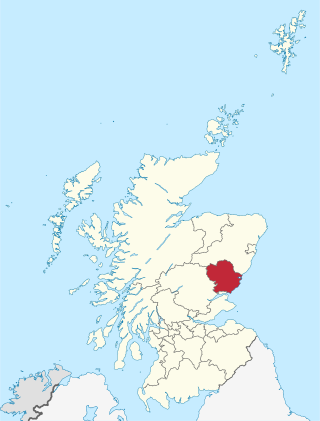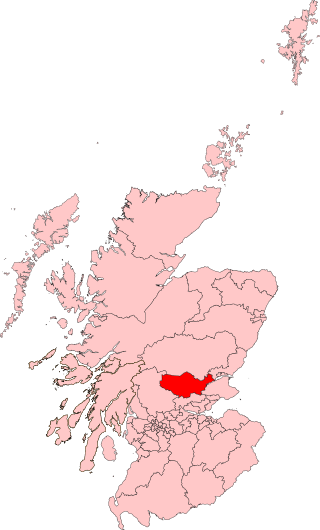
Angus is one of the 32 local government council areas of Scotland, a registration county and a lieutenancy area. The council area borders Aberdeenshire, Dundee City and Perth and Kinross. Main industries include agriculture and fishing. Global pharmaceuticals company GSK has a significant presence in Montrose in the east of the county.

Angus is a county constituency of the House of Commons of the Parliament of the United Kingdom. It elects one Member of Parliament (MP) by the first-past-the-post voting system. It is currently represented by Dave Doogan of the Scottish National Party who has been the MP since 2019.
Banffshire was a constituency of the House of Commons of Great Britain from 1708 to 1800, and of the House of Commons of the Parliament of the United Kingdom from 1801 to 1983. It elected one Member of Parliament (MP), using the first-past-the-post voting system.
Elgin Burghs was a district of burghs constituency of the House of Commons of Great Britain from 1708 to 1801 and of the House of Commons of the United Kingdom from 1801 to 1918. Until 1832, when Peterhead was added, the constituency comprised the parliamentary burghs of Elgin, Cullen, Banff, Inverurie and Kintore, lying in Elginshire, Banffshire and Aberdeenshire.
Ross and Cromarty was a county constituency of the House of Commons of the UK Parliament from 1832 to 1983. It elected one Member of Parliament (MP) using the first-past-the-post voting system.
Dundee was a constituency of the House of Commons of the Parliament of the United Kingdom from 1832 to 1950, when it was split into Dundee East and Dundee West.
Greenock was a burgh constituency represented in the House of Commons of the Parliament of the United Kingdom from 1832 until 1974, when it was abolished and its area was merged into the new Greenock and Port Glasgow constituency.
Forfarshire was a Scottish county constituency represented in the House of Commons of Great Britain from 1708 until 1800, and then in the House of Commons of the United Kingdom until 1950.
Kilmarnock Burghs was a district of burghs constituency of the House of Commons of the Parliament of the United Kingdom from 1832 to 1918. It elected one Member of Parliament (MP) by the first-past-the-post voting system.
Dunbartonshire was a county constituency of the House of Commons of Great Britain from 1708 to 1801 and of the House of Commons of the Parliament of the United Kingdom from 1801 to 1950.

Perth was a constituency of the House of Commons of the Parliament of the United Kingdom from 1832 to 1918, 1918 to 1950, and 1997 to 2005. From 1832 to 1918 it was a burgh constituency. From 1918 to 1950, and 1997 to 2005, it was a county constituency. During each of the three periods it elected one Member of Parliament (MP).
Buteshire was a county constituency of the House of Commons of the Parliament of Great Britain from 1708 to 1801 and of the Parliament of the United Kingdom from 1801 to 1918.
Angus North and Mearns was a county constituency represented in the House of Commons of the Parliament of the United Kingdom from 1950 to 1983. It elected one Member of Parliament (MP) by the first past the post voting system.
Stirling Burghs was a district of burghs constituency of the House of Commons of the Parliament of the United Kingdom from 1708 to 1918.
Falkirk Burghs was a district of burghs constituency of the House of Commons of the Parliament of the United Kingdom from 1832 to 1918. The constituency comprised the burghs of Falkirk, Airdrie, Hamilton, Lanark and Linlithgow, lying in Stirlingshire, Lanarkshire and Linlithgowshire.
Wick Burghs, sometimes known as Northern Burghs, was a constituency of the House of Commons of the Parliament of the United Kingdom from 1832 to 1918. It elected one Member of Parliament (MP) by the first past the post voting system.
Ayr Burghs was a district of burghs constituency of the House of Commons of the Parliament of Great Britain from 1708 to 1800 and of the House of Commons of the Parliament of the United Kingdom from 1801 to 1950. It elected one Member of Parliament (MP), using the first-past-the-post voting system.
Aberdeen Burghs was a district of burghs constituency which was represented from 1708 to 1800 in the House of Commons of the Parliament of Great Britain, and from 1801 to 1832 in the House of Commons of the Parliament of the United Kingdom.
Perthshire was a Scottish county constituency of the House of Commons of the Parliament of Great Britain from 1708 to 1801 and of the Parliament of the United Kingdom from 1801 until 1885, representing a seat for one Member of Parliament (MP).
Kirkcaldy Burghs was a burgh constituency of the House of Commons of the Parliament of the United Kingdom (Westminster) from 1832 to 1974. It elected one Member of Parliament (MP) by the first-past-the-post voting system. From 1832 to 1950 it was, officially, a district of burghs constituency.





